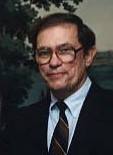February 20: James A. Haught (1932)
It was on this date, February 20, 1932, that American newspaper editor and writer James A. Haught was born. As he writes in “A Freethinker’s Testimony” (7/9/2011), “Just because you grow up in the Bible Belt (I was born in a West Virginia hamlet with no electricity) doesn’t mean automatically that you’re a fundamentalist. My family never went to church. Most people I knew laughed at ‘holy rollers.’” Rising through the ranks at West Virginia’s largest newspaper, the Charleston Gazette Mail, Haught has been with the paper for more than 50 years and is currently its editor emeritus. He is also senior editor for Free Inquiry magazine (published by the Council for Secular Humanism) and is author of numerous magazine and newspaper articles and blog postings on religion and ethics. He is the winner of 15 national newspaper writing awards. Among his published books are Holy Horrors: An Illustrated History of Religious Murder and Madness (1990), Holy Hatred: Religious Conflicts of the ’90s (1995), 2000 Years of Disbelief: Famous People With the Courage to Doubt (editor, 1996), Honest Doubt: Essays on Atheism in a Believing Society (2007) and Fading Faith: The Rise of the Secular Age (2010).
Haught calls himself a skeptic and an agnostic. In his early newspaper days he was assigned to the religion beat as more objective because of his non-belief. As Haught later wrote,
I was a newspaper church columnist for many years. Endlessly, I heard ministers proclaim that religion instills love and compassion in believers. It’s a universal message. Meanwhile, back at the paper, our headlines said:
“Hindus, Muslims, Sikhs Massacre Each Other in India”
“Protestant Gunmen Kill Catholics in Belfast, and Vice Versa”
“Shi’ites in Iran Hang Baha’i Teens Who Won’t Convert”
“Christian Snipers Pin Down Muslim Machine-Gunners in Beirut”
“Hands and Feet Chopped Off Under Islamic Law in Sudan”Politicians always call religion a mighty force for good. … There’s a tinge of the Twilight Zone in the constant declarations that religion creates love, when opposite results are everywhere. … Religion always is hailed as the cure for the world’s evils. But, too often, it’s the problem, not the solution.[1]
About the divisiveness of religion, Haught wrote the following in the 1990s,
Ronald Reagan often called religion the world’s mightiest force for good, “the bedrock of moral order.” George Bush said it gives people “the character they need to get through life.” This view is held by millions. But the truism isn’t true. The record of human experience shows that where religion is strong, it causes cruelty. Intense beliefs produce intense hostility. Only when faith loses its force can a society hope to become humane.
… Obviously, people who think religion is a force for good are looking only at Dr. Jekyll and ignoring Mr. Hyde. They don’t see the superstitious savagery pervading both history and current events.
During the past three centuries, religion gradually lost its power over life in Europe and America, and church horrors ended in the West. But the poison lingered. … It’s fashionable among thinking people to say that religion isn’t the real cause of today’s strife in Lebanon, Sri Lanka, Northern Ireland, India and Iran – that sects merely provide labels for combatants. Not so. Religion keeps the groups in hostile camps. Without it, divisions would blur with passing generations; children would adapt to new times, mingle, intermarry, forget ancient wounds. But religion keeps them alien to one another.
Anything that divides people breeds inhumanity. Religion serves that ugly purpose.[2]
After the terrorist attacks of 9/11/2001, Haught went further,
Osama bin Laden achieved a remarkable feat: He mobilized the power of religion to spur devout young men to kill themselves in order to murder defenseless strangers. Grotesquely, the suicide-killers felt they were performing holy acts that would please God and assure them martyr rewards in paradise.
The annals of faith-based killing are long: human sacrifice, the Crusades, the Inquisition, witch-hunts, Reformation wars, drowning of Anabaptists, jihads, pogroms against Jews, China’s Taiping Rebellion, Mexico’s Cristero War, and many modern ethnic conflicts fueled by “religious tribalism.” …[3]
On this website, which was a rich trove of his insights, books and articles, Haught writes, “Personally, I've waged a long crusade for rational, scientific thinking as an antidote for harmful supernaturalism. … Although billions of people pray to invisible gods, there’s no actual evidence of deities and devils, heavens and hells, spirits and prophecies, etc. They’re just imaginary, as far as a sincere inquirer can tell. So, to me, the only honest viewpoint is the humanist one, which doubts the supernatural and focuses on improving human life.”
About the end of life, Haught wrote in Free Inquiry,
My journey on the road has been proceeding for eight decades. Actuarial tables make my future so obvious that I can’t shut my eyes to it. Life proceeds through stages, and I’m in the last scene of the last act.
I have a Pantheon of my favorite heroes: Einstein, Jefferson, Voltaire, Lincoln, Carl Sagan, Shakespeare, Martin Luther King Jr., Tolstoy, FDR, Beethoven, Epicurus, Gandhi, etc. They uplifted humanity, even transformed humanity, in their day – but their day ended, and life moved on. My day was the 1960s, and ’70s, and ’80s, even the ’90s.
I was a Whirling Dervish in the thick of everything. Life was a fascinating carnival. But it slides into the past so deftly you hardly notice. While my clock ticks away, I’ll pursue every minute. Carpe diem. Make hay while the sun shines. And then I’m ready for nature’s blackout, with no regrets.[4]
[1] “Murder in the Name of Religion,” essay, 7/5/2011. [2] “Religion’s Death Toll,” essay, 1990 (link is a re-posting). [3] “The Baffling Era of Religious Suicide-Massacres,” essay, May 27, 2011. [4] “Clock is ticking on my life,” essay, the Charleston Gazette, September 21, 2013; reprinted from Free Inquiry magazine.


